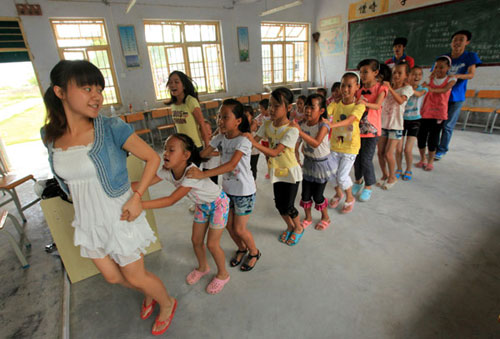 |
|
Students from Guangxi University of Science and Technology play with pupils in Tantou township, Liuzhou city, Guangxi Zhuang autonomous region, in July. English, dancing, painting and calligraphy classes were held for the pupils during summer vacation. Tan Kaixing / for China Daily
|
To the casual observer, Duancun, located 100 kilometers from Beijing in Hebei province, is a wholly unremarkable town. A narrow, dusty road meanders through the old town center; gardens stretch out behind residences, in which a variety of vegetables are grown, and recently harvested crops dry in the sun on rooftops and pathways.
But Duancun has a remarkable secret. Visit the town on the weekend and walk down the main street, and you’ll hear delicate music wafting over you. It’s not the humdrum loudspeaker monotone, a relic of China’s revolutionary past, still heard at sunrise and sunset in many towns. Rather, Duancun’s melodiousness is a sign of China’s revolutionary future: a countryside filled with music and the arts.
The music originates from Xiti Primary School. There, young pupils work on their scales, join forces in an orchestra, and sing in a choir. The full range of instruments – clarinets, violins, trumpets and all the rest – is on offer, and children are free to choose their favorite. As practice time begins, their dulcet tones light up the whole town.
It wasn’t always this way. Duancun has benefited in recent years from efforts by the Beijing Hefeng Art Foundation to popularize and promote arts education in the countryside. Li Feng, the foundation’s founder, says that an education in the arts makes children proud, confident and creative. For those from disadvantaged backgrounds, the arts can also be a daily respite. In cooperation with rural schools, Li and his colleagues send volunteers and professional teachers to the countryside, and also train local educators to provide children with music, dance, painting and drama lessons. Furthermore, the foundation provides schools with musical instruments, painting kits, instruction booklets and many other items the children need to get involved in the arts.
Sowing Seeds of Art
Liu Yipeng is a pupil with a passion for music. She still gets excited when talking about auditions for the village orchestra in December 2012. It was a windy winter’s day, she said. Parents accompanied their budding virtuosos from all across the village to try out. Many turned up just to witness what was a historical event for the town.
Li Feng brought in an old 20-inch TV from the town’s government offices to show people what a professional orchestral performance looked like. For many, it was the first time they had seen such a performance. Many questioned why the orchestra members were so formally dressed when they came on stage, but they were soon awed to silence by the beautiful melody. When the performance ended, Li Feng informed the crowd they had just heard Beethoven’s Egmont Overture.
Liu Yipeng said she was touched by the music, and especially by the performance of the lead clarinetist. “It was actually the first time I learned that there is such an instrument,” she added. That day, all the children present registered to join Li Feng’s orchestra.
Now, out of the 600 primary school students in Duancun Town, 260 regularly attend the free classes in the arts. Every weekend, professional teachers-cum-volunteers from the Central Conservatory of Music, the Central Academy of Drama, the Beijing Dance Academy, Beijing Normal University and a number of other institutions make the trip to Duancun to teach.
Liu Yipeng said she was very nervous when she took her first music class. She was afraid she would break the instrument. During class, she was all eyes and ears; her teacher, after all, was a professional musician. Her mother, Feng Hongli, would sit quietly by as an observer, taking notes. “If she forgot an exercise or a technique later at home, I had my notes, and I would explain things again to her,” she said.
In Yipeng’s mother’s eyes, learning a skill – any skill – can only be a good thing. She had wanted to send her daughter to music class a few years ago, but at that time there were no qualified teachers in the village. Going to the next town to study was out of the question. Now, a musical education, once only a dream in this part of China, is a reality, and a calling for many.
Liu Yipeng sits by the mill in her yard after dinner every day to practice the clarinet for one hour. After only four classes, she could play Twinkle Twinkle Little Star. She was so enthused by her early success that she went over to her grandparents’ house and performed it over and over again. Her grandparents were delighted.
Liu Yipeng knows more than one song these days. She continues to look forward to her classes, which take place every weekend. She still performs for relatives and friends, and tells them everything she knows about the clarinet at the same time. She’s a fast learner, her teacher says, and she’s grown more confident in both performance and general conversation as a result of her new-found passion. She’s even got a fan – her five-year-old brother. A love for music has spread throughout her family. When her mother goes out to work in the field, she often takes a tape player with her to listen to symphonies.
We recommend:
